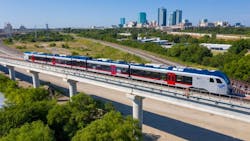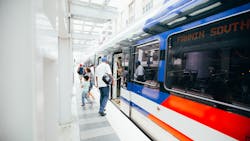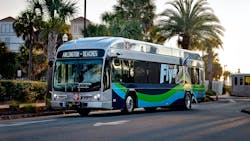Trio of transit projects approved to use federal portion of project savings to further project impacts
Two transit projects in Texas and one in Florida will see their federal funding go a bit further following the Federal Transit Administration’s (FTA) approval that the project sponsors could use the federal share of project cost savings on additional activities related to the three projects.
Trinity Metro in Fort Worth, Texas, Metropolitan Transit Authority of Harris County (Houston Metro) and Jacksonville Transportation Authority (JTA) in Jacksonville, Fla., will be able to use a combined $64.2 million to further invest in their individual transit projects funded through the Capital Investment Grants (CIG) Program. Rather than the federal share of the cost savings coming back to the government, the project sponsors will use the funds to extend rail and bus systems and construct a transit facility.
"FTA considers and approves additional project activities using the federal share of a project’s cost savings," said FTA Acting Administrator K. Jane Williams. "We encourage project sponsors who deliver complete projects under budget to discuss these options with us to maximize the benefits that cost savings can bring to their communities."
Trinity Metro opened its TEXRail project 12 months ahead of schedule and $80.6 million under budget in January 2019. Trinity Metro will retain up to $38.9 million in the federal share of project cost savings to build a $100-million, 2.1-mile extension of TEXRail from the Texas & Pacific Station to a proposed medical district, a growing area located southwest of downtown Fort Worth.
“The Fort Worth Medical District is an ideal location for the next station because of the 40,000 people who work and visit that area. Extending TEXRail is perfect for medical professionals, patients and visitors,” said Trinity Metro President and CEO Bob Baulsir.
"We are very pleased with the federal government's decision. As Metro continues to look for opportunities to improve mobility throughout our region, federal participation will be critical," said Houston Metro President and CEO Tom Lambert.
JTA completed the East Corridor BRT project 25 months early and $13.6 million under budget and the BRT extension project is estimated to cost $13.6 million.
“We are thankful that we can utilize these funds, which otherwise would’ve been returned to the FTA, to enhance our BRT network in downtown Jacksonville,” said JTA CEO Nathaniel P. Ford, Sr. “This is another example of the trust our federal partners have in the JTA to complete projects under budget and ahead of schedule.”
About the Author

Mischa Wanek-Libman
Group Editorial Director
Mischa Wanek-Libman is director of communications with Transdev North America. She has more than 20 years of experience working in the transportation industry covering construction projects, engineering challenges, transit and rail operations and best practices.
Wanek-Libman has held top editorial positions at freight rail and public transportation business-to-business publications including as editor-in-chief and editorial director of Mass Transit from 2018-2024. She has been recognized for editorial excellence through her individual work, as well as for collaborative content.
She is an active member of the American Public Transportation Association's Marketing and Communications Committee and served 14 years as a Board Observer on the National Railroad Construction and Maintenance Association (NRC) Board of Directors.
She is a graduate of Drake University in Des Moines, Iowa, where she earned a Bachelor of Arts degree in Journalism and Mass Communication.


